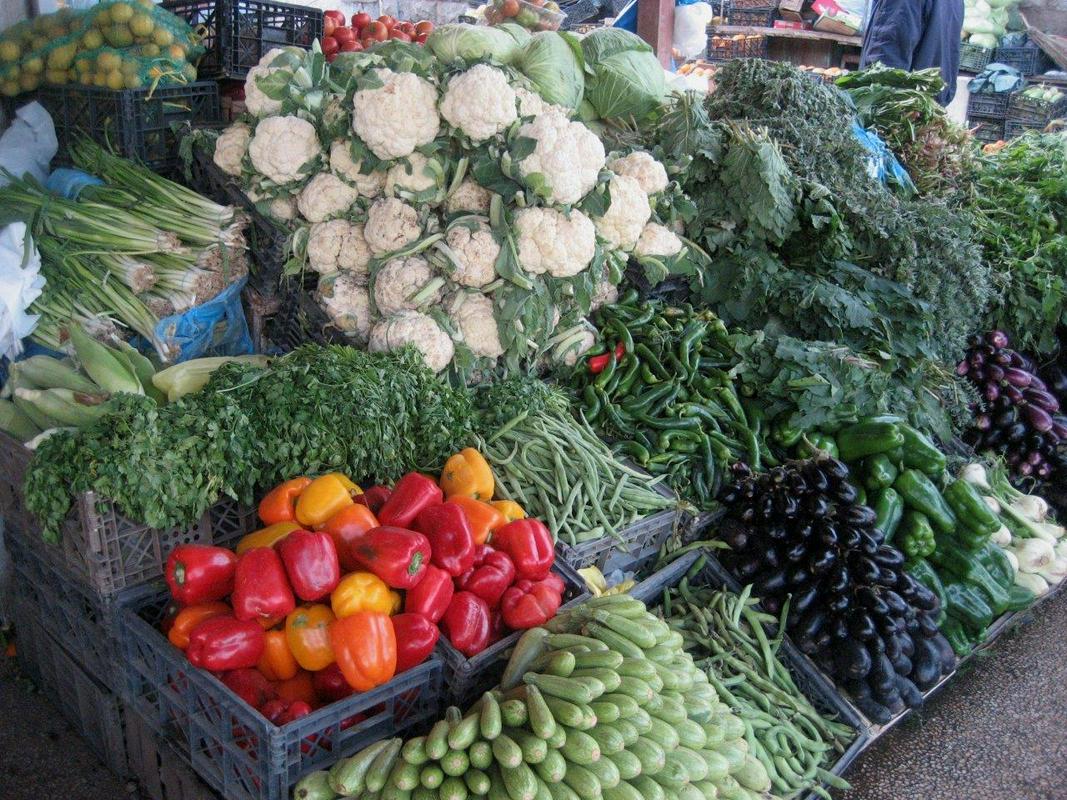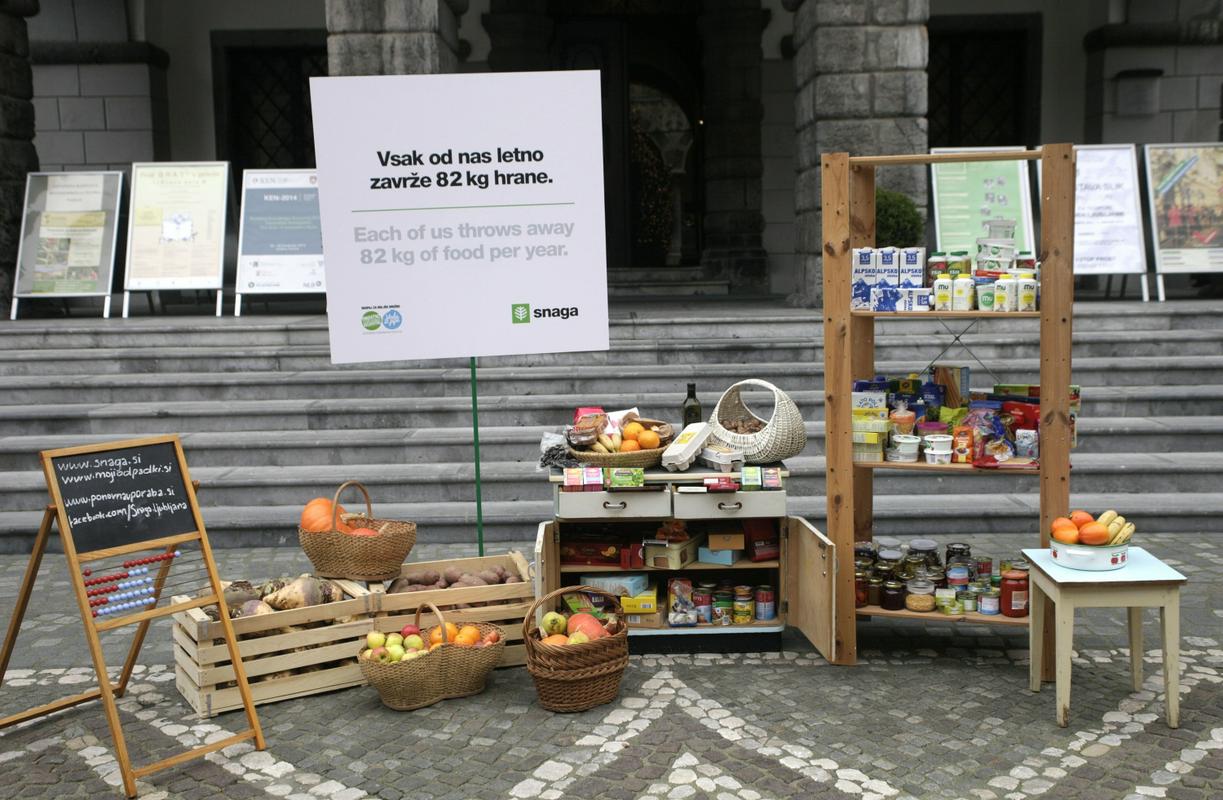

There are no exact figures for the quantity of wasted food in the country. The Ministry of Environment and Spatial Planning estimates that we throw away at least 250 grams of food on a daily basis. Figures coming from the Environmentalists Without Borders are much more harsh - they assess that in 2011 there were at least 168.000 tones of wasted food, or even up to 270.000 tones, in the whole of Slovenia.
"Both figures are exceptionally big. That means that in Slovenia we throw away more than 82 kilograms of food per person (note: that according to the worst-case scenario). Almost a half, or a little less, of that figure falls on households, while the rest is contributed by the industry – from food production to processing and stores," is what Albin Keuc from the Environmentalists Without Borders association told radio station Val 202. Only a minimal part of the food we throw away (around 10 percent) is processed. The rest ends up as garbage.
Mostly vegetables, fruit and bread in the garbage
The Environmentalists Without Borders conducted a web survey in May asking people how much and what kind of food they throw away. They also asked people what they do with their leftover food and similar questions. Those that took part in the survey revealed that their households mostly throw away fresh vegetables and salad (around 40 percent of the respondents). 36 percent replied that they throw away fruit, 33 percent said they throw away bread, while 22 percent throw away dairy products. Less often the respondents also throw away frozen food, meat, fish, as well as juices and other beverages.
A good fifth of the respondents said they don't throw away anything. That doesn't mean they don't produce leftover food - all the leftovers and food that has gone bad either end up in the bellies of house pets and farm animals or in the compost. In this case the Environmentalists Without Borders raise an important question: is food which is "processed" in such a way considered as wasted food or not?
When do we throw away food the most? The same survey shows that people mostly throw away leftovers from preparing a meal. That's followed by food that has gone bad, leftovers from plates, foodstuff with past expiration dates, and leftovers from too much prepared food. And is there a reason why all this food ends up in the trash? "80 % of the households state mould as a reason for throwing away food. The second reason for 41% of households are the past expiration dates, while for 17 % the second reason for wasting food is its bad taste. 8 % of the households say they throw away food because they buy too much, and 4 % state food that comes in big packages as a reason for throwing some if it away," is how the Environmentalists Without Borders explain it.
The wolf be full, the sheep unharmed - A platform for a Slovenia without wasted food
The Environmentalists Without Borders association has come up with a campaign entitled Volk sit in koza cela (The wolf be full, the sheep unharmed). The aim of the campaign is to raise people's awareness about the quantity of food they waste and find ways to keep their food fresh (and unspoiled) for a longer period of time. The campaign also wants to encourage the more efficient use of food and the creating of a national platform for a Slovenia without wasted food. The association has also set a target, which it considers to be reachable – to reduce the quantity of wasted food by 50 percent until the year 2025.
The association presented its initiative at a round table discussion at the recent Nature and Health fair. Apart from Albin Keuc from the Environmentalists Without Borders, others who participated in the discussion were biotechnologist Peter Raspor, the head of the Chamber of Agriculture and Forestry, Branko Ravnik, a representative of the Chamber of Agricultural and Food Enterprises, Jana Ramuš, the Mayor of Vrnika, Stojan Jakin, the head of the Ljubljana Snaga public company, Janko Kramžar, school prinicple Blanka Vombergar, Zdenko Podlesnik from the Lions District Slovenia, as well as MEP and former agriculture and environment minster Franc Bogovič.
During the debate the participants ascertained that large amounts of wasted and disposed food occur in the food-consumption cycle from "farm to fork". It was agreed that measures are necessary in all areas where food is being thrown away. They also concluded that the figures for the amount of wasted food can also serve as an opportunity to modernize Slovenia's food cycle and stimulate the demand for organic and locally produced food.
Food as a consumer good - and that's how its produced
The head of the Chamber of Agriculture and Forestry, Branko Ravnik, warned that food is becoming a consumer good, which means there is a mass production of it - especially abroad. As a consequence it also has to travel farther to reach Slovenian buyers. He sees the solution to the problem of wasted food in local production and consumption. But before that people need to be educated that it's not always necessary to buy perfect products with a long shelf life. Products with a different look are most often better and healthier, and have at the same time traveled less to reach its buyers.
"A distorted attitude towards food"
Peter Rapsor, a doyen of Slovenian biotechnology, emphasizes: “Wasted food occurs as a result of an oversupply of food and a distorted attitude towards it." The bigger demand, and consequently more wasted food, is also caused by excessive food advertising.
Jana Ramuš is of a similar opinion. "Many people don't have an attitude towards food," she warned at the round table. She herself sees the solution in a more effective farm-food chain, which could reduce the amount of waste in the whole food industry. Rastor also stresses that "we have to break the mistrust in the whole food-supply chain with knowledge. And a reasonable supervision must be in place, which would enable the functioning, technological modernization, safety and good ethics of the whole food-supply chain. A chain which is extremely important for Slovenia."
Too many impractical laws
And if the solutions do seem simple, current legislation makes things complicated. The Mayor of Vrhnika, Stojan Jakin, warns that local communities are somewhat "handicapped" when it comes to their role in preserving the environment, and in this case limiting the amount of wasted food. He stresses that there are too many laws which are difficult to implement, because they are impractical. He is convinced that making people and little children aware of what it means to lead a healthy life would help reduce the amount of wasted food. He also calls for food advertising to be brought under control.

































































